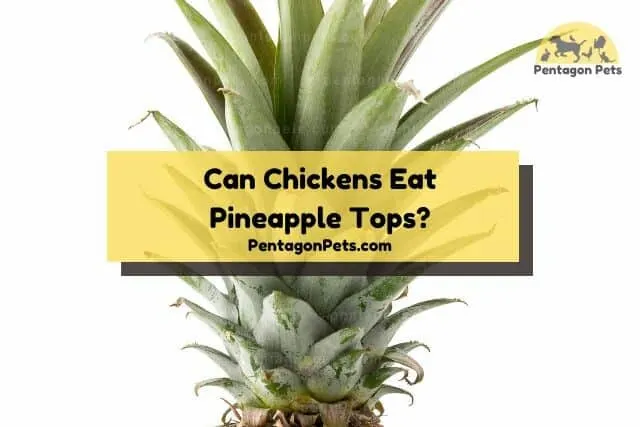Raising chickens and ensuring their health involves knowing what they can and cannot eat. One question many chicken keepers face is whether they can safely feed their flock pineapple. This tropical fruit has gained popularity among humans for its sweet, tangy taste and numerous health benefits. But is it a suitable treat for birds?
There is no need for concern, as pineapples are generally safe for chickens to consume. The fruit is packed with essential nutrients, antioxidants, and vitamins that can contribute to the overall health of a flock. However, moderation is key when offering pineapples to chickens, as an excessive intake of sugary and acidic fruits can cause digestive problems. Therefore, chicken owners should consider providing pineapple as an occasional treat rather than a staple in their birds’ diets.

Can Chickens Eat Pineapple?
Chickens can indeed eat pineapple, as it is generally safe and non-toxic for them. Pineapple is packed with essential vitamins and minerals, such as vitamin C, vitamin A, and potassium. These nutrients can contribute to the overall health of chickens, providing them with a healthy treat option.
However, moderation is key when it comes to feeding pineapple to chickens. Consuming too much pineapple can lead to potential health issues, such as irritation in the digestive system, due to its acidic nature. Furthermore, pineapple is high in sugar content, which can lead to weight gain and other health problems when consumed in excess.
When offering pineapple to chickens, it is important to ensure that it is properly prepared. Fresh, ripe pineapple should be cut into small, bite-sized pieces, and the spiky skin and tough core should be removed. Chickens may struggle to digest large chunks or chew on the hard outer layer, both of which can cause potential harm.
Feeding chickens pineapple a few times a week can add variety to their diet while providing them with essential nutrients. However, it should not replace their regular feed, which should consist of a well-balanced mixture of grains, protein, and other essential nutrients.
To further enhance the nutritional benefits of pineapple for chickens, consider incorporating it with other fruits and vegetables, such as leafy greens, berries, or melons. By offering a diverse diet, chickens can benefit from a wider range of essential vitamins and minerals, supporting their overall health and well-being.
Is It Safe and Should Your Chickens Have It?
Feeding chickens pineapple is generally safe, as long as it is given in moderation. Pineapple contains many essential nutrients, such as vitamins A and C, and has anti-inflammatory properties that may benefit the overall health of your chickens.
However, safety precautions should be taken to ensure that the chickens do not consume too much pineapple as it could lead to digestive issues. The high sugar content in pineapple can disrupt the balance in the gut of chickens, especially since their digestive systems are not designed to process large amounts of sugar.
To feed pineapple safely, remove the tough outer skin and ensure that the pineapple is cut into small, bite-sized pieces. This makes it easier for the chickens to peck at and consume without the risk of choking. It is also important to remove the inedible core, which can pose a choking hazard as well.
Chickens should be given pineapple as an occasional treat, not a staple food in their diet. A good rule of thumb is to offer pineapple no more than once or twice a week. Also, remember to provide fresh water and a balanced feed that meets their nutritional needs, as treats alone cannot sustain their growth and overall health.
Lastly, avoid feeding moldy or spoiled pineapple to chickens. Consuming moldy food can lead to serious health problems for your birds, such as respiratory issues and infections.
While pineapple can be a tasty and beneficial treat for chickens, it should be given in moderation, with proper preparation, and as part of a balanced diet. Your chickens will enjoy this sweet treat while reaping some health benefits too.
What to Look Out for When Feeding Chicken with Pineapple
Feeding chickens with pineapple can be a healthy treat, but there are some important factors to consider. Moderation is key when giving your chickens pineapple. Too much pineapple can cause digestive issues due to its high sugar and acidic content.
Fresh pineapple is the best option for your chickens. Overripe or rotten pineapple should be avoided as it contains higher levels of sugars and acids that could harm your chickens. Ensure that the pineapple is thoroughly cleaned and the outer skin is removed, as it can be tough for chickens to digest.
Chickens can consume both pineapple flesh and core. However, it is crucial to remove any seeds before feeding, as they could pose a choking hazard. Cut pineapple into small, manageable pieces to avoid this risk.
Consider the following when offering pineapple to your chickens:
- Provide only a small amount as a treat, not as a daily feed.
- Remove any seeds or inedible parts.
- Avoid canned or processed pineapple, as they often contain added sugars and preservatives.
- Always ensure that pineapple is fresh and clean.
Keep an eye on your chickens when introducing pineapple as a treat. If you notice any changes in their behavior or digestive issues, discontinue feeding them pineapple and seek the advice of a veterinarian.
Can Chickens Eat Pineapple Skins/Rinds?

Chickens can eat pineapple skins, but it is important to be cautious and selective when feeding them these rinds. Although pineapples are packed with nutrients and considered a great treat for chickens, their tough outer skins may pose some risks to the birds.
Firstly, pineapple skins are difficult to digest for chickens. The tough, fibrous texture might be hard for them to grind down and properly process. Consequently, chickens may experience indigestion or gastrointestinal obstructions.
Additionally, pineapple skins may contain traces of pesticides, especially if they are not organically grown. These chemicals can be harmful to chickens and may lead to various health issues. Therefore, it is crucial to clean pineapple skins thoroughly before feeding them to the birds.
To ensure your chickens enjoy the benefits of pineapple without the risks of the skins, consider peeling the fruit and cutting it into small, manageable pieces. This way, your chickens can safely consume the treat without facing potential digestive issues.
While chickens can eat pineapple skins, it is recommended to remove the rinds and provide the flesh of the fruit for a healthier and safer treat. This will help prevent any potential health problems and ensure your birds enjoy a nutritious snack.
Can Chickens Eat Pineapple Tops?

Chickens can eat pineapple tops, but with some precautions. The leaves and tough outer skin are fibrous and can be difficult for chickens to digest. It is important to note that any overconsumption of pineapple tops can lead to discomfort and health issues in chickens.
When feeding pineapple tops to chickens, moderation is key. A small amount, occasionally given as a treat, is usually safe. Remove the leaves from the pineapple top, and cut the flesh into small, bite-sized pieces. This way, chickens can enjoy the sweet and tangy fruit without risking their health.
It is crucial to pay attention to any changes in a chicken’s behavior after consuming pineapple tops. If they show signs of discomfort, such as a decrease in activity or a lack of interest in food, it is best to stop offering pineapple tops immediately.
Chickens can eat pineapple tops, but in limited quantities. Removing the leaves and cutting the pineapple into small pieces will help reduce the risk of health issues. It is essential to monitor the chickens for any signs of discomfort, and adjust their diet accordingly.
Can Chickens Eat Pineapple Weeds?

Chickens can indeed eat pineapple weeds, which are a common type of weed known scientifically as Matricaria discoidea. These weeds have a mild, pineapple-like aroma and flavor, making them an interesting addition to a chicken’s diet. It is important for poultry owners to keep in mind that these plants should be provided in moderation.
Pineapple weeds are generally safe for chickens to consume, as they are non-toxic and edible for both humans and animals. In fact, these plants are considered a nutritious wild green, containing vitamins and minerals that can benefit a chicken’s overall health.
This article was first published on August 18, 2023 by Pentagon-Pets.
However, it is essential to be cautious when introducing new plants to a chicken’s diet, as individuals may react differently to a new food item. Some chickens may not enjoy the taste of pineapple weeds, while others might overindulge, which can cause digestive issues. To avoid these potential problems, it is best to introduce pineapple weeds gradually and monitor the chickens’ responses to ensure they are not experiencing any adverse effects.
One aspect to consider when feeding chickens pineapple weeds is the environment in which they are grown. Some areas may have been subjected to pesticides or other harmful chemicals, and consuming contaminated plants can negatively affect the chickens’ health. To avoid this risk, it is crucial to source plants from clean, pesticide-free areas.
Pineapple weeds can be a beneficial and safe addition to your chickens’ diet when managed responsibly. Just make sure they are sourced from clean environments and introduced gradually to ensure the wellbeing of your flock.
Can Chickens Eat Pineapple Core?

Chickens can eat pineapple core, but it is not recommended to feed them large quantities. Pineapple core is tougher and more fibrous than the fruit’s flesh, making it difficult for chickens to digest. The core also contains less nutrients when compared to the fruit’s flesh, so it does not provide significant benefits to their diet.
It is essential to monitor the chickens when they are eating pineapple core, as the hard texture may present a choking hazard. To mitigate this risk, it is advised to chop the core into small pieces before offering it to the chickens. This also ensures that they consume the pineapple core in moderation, preventing any potential digestive issues.
Pentagon Pet is the owner of this article that was first published on August 18, 2023.
As a cautionary measure, it is crucial to initially offer your chickens a small amount of pineapple core and observe their reactions. In case you notice any unusual behavior or discomfort, it is best to remove the pineapple core from their diet and consult a veterinarian for further guidance.
To offer a well-balanced and nutritious diet, it is suggested to provide chickens with a mix of fruits, vegetables, grains, and proteins. Including a variety of nutrients in their diet is essential to maintain their overall health and well-being.
Can Baby Chickens Eat Pineapple?

Baby chickens, also known as chicks, can eat pineapple in moderation. Pineapple is a nutritious and tasty treat that can offer a variety of essential vitamins and minerals for these young birds. However, it is important to note that chicks have different nutritional needs compared to adult chickens.
To ensure their optimal growth and development, baby chicks need a diet that is high in protein. Commercial feed specifically formulated for chicks is the best choice, as it provides a balanced and complete nutrition. Introducing small amounts of pineapple as a treat can complement their diet, but should not replace their primary feed.
When offering pineapple to baby chickens, it is crucial to remove the tough, outer skin and the woody core, as these parts may pose a choking hazard or be difficult for them to digest. Chopped, bite-sized pieces are ideal for chicks to safely consume.
This article and its contents are owned by Pentagon Pets and was first published on August 18, 2023.
It is also important to note that while pineapple can be a healthy snack for baby chickens, too much of it may lead to digestive issues. The natural acidity and high sugar content of the fruit can potentially upset their stomachs and cause diarrhea. To avoid these issues, portions should be kept small and infrequent, and vets recommend a maximum of once or twice a week.
